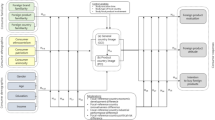Abstract
In the contemporary marketplace, country of origin (COO) has been considered one of the most significant phenomena impacting evaluations of foreign products. Understanding consumer behavior in relation to the perception of COO provides fundamentals to strategic decisions in marketing and consumer behavior. The question of how COO information cues are utilized by consumer insights in what conditions is important in product evaluations. This study endeavored to provide an approach to understanding COO perceptions based on consumer expectations of foreign products. Interviews were conducted with 170 undergraduates in China with the help of a formal questionnaire to collect data. Confirmatory Factor Analysis was conducted in order to examine four types of consumer expectations of foreign products: Economic, Information, Social and Personality. Based on the results, it was concluded that when a consumer buys a foreign product, he considers the economic value of the product, wants more information about the product, and considers to what extent the product has an impact on social status and how the product enhances personality. Moreover, the Goodness of Fit indices of the derived model of consumer expectations of foreign products indicated the potential of using the approach to examine consumer expectations of these products.


Similar content being viewed by others
References
Knight, G.A., Spreng, R.A. and Yaprak, A. (2003) Cross-national development and validation of an international business measurement scale: The COISCALE. International Business Review 2: 581–599.
Bilkey, W. J. and Nes, E. (1982) Country of origin effects on product evaluations. Journal of International Business Studies 13 (2): 89–99.
Zhang, Y. (1996) Chinese consumers’ evaluation of foreign products: The influence of culture, product types and product presentation format. European Journal of Marketing 30 (12): 50–68.
Brodowsky, G.H., Tan, J. and Meilich, O. (2004) Managing country-of-origin choices: Competitive advantages and opportunities. International Business Review 13: 729–748.
Baker, M.J. and Ballington, L. (2002) Country of origin as a source of competitive advantage. Journal of Strategic Marketing 10: 157–168.
Knight, G.A. (1999) Consumer preferences for foreign and domestic products. Journal of Consumer Marketing 16 (02): 51–162.
Janda, S. and Rao, C.P. (1997) The effect of country-of-origin related stereotypes and personal beliefs on product evaluation. Psychology & Marketing 14 (7): 689–702.
Peterson, R.A. and Jolibert, A.J.P. (1995) A meta-analysis of country of origin effects. Journal of International Business Studies 26 (4): 883–900.
Roth, M.S. and Romeo, J.B. (1992) Matching product category and country image perceptions: A framework for managing country of origin effects. Journal of International Business Studies 23 (3): 477–497.
Quester, P.G., Dzever, S. and Chetty, S. (2000) Country-of-origin effects on purchasing agents’ product perceptions: an international perspective. Journal of Business & Industrial Marketing 15 (7): 479–490.
Samiee, S. (1994) Customer evaluation of products in a global market. Journal of International Business Studies 25 (3): 579–604.
Zhang, Y. (1997) Country-of-origin effect: The moderating function of individual difference in information processing. International Marketing Review 14 (4): 266–287.
Han, C.M. and Terpstra, V. (1988) Country of origin effects for uni-national and bi-national products. Journal of International Business Studies 19 (2): 235–255.
Agrawal, J. and Kamakura, W.A. (1999) Country of origin: A competitive advantage? International Journal of Research in Marketing 16: 255–267.
Schooler, R.D. (1965) Product bias in the Central American Common Market. Journal of Marketing Research 2 (4): 394–397.
Nagashima, A. (1970) A comparison of Japanese and US attitudes towards foreign products. Journal of Marketing 34: 68–74.
Johansson, J.K., Douglas, S.P. and Nonaka, I. 1985 Assessing the impact of country of origin on product evaluations: A new methodological perspective. Journal of Marketing Research 22 (4): 388–396.
Elliott, G. and Cameron, R.C. (1994) Consumer perception of product quality and the country of origin effect. Journal of International Marketing 02 (2): 49–62.
Pisharodi, M.R. and Parameswaran, R. (1992) Confirmatory factor analysis of a country of origin scale: Initial results. Advances in Consumer Research 19: 706–714.
Hong, S. and Wyer, R.S. (1990) Determinants of product evaluation: Effects of the time interval between knowledge of a product's country of origin and information about its specific attributes. The Journal of Consumer Research 17 (3): 277–288.
Jo, M.S., Nakamoto, K. and Nelson, J.E. (2003) The shielding effects of brand image against lower quality countries-of-origin in global manufacturing. Journal of Business Research 56: 637–646.
Schooler, R.D. (1971) Bias phenomena attendant to the marketing of foreign goods in the USA. Journal of International Business Studies 2 (1): 71–80.
Green, P.E. and Wind, Y. (1975) New way to measure consumers' judgments. Harvard Business Review 53 (4): 107–117.
Singh, J., Howell, R.D. and Rhoads, G.K. (1990) Adaptive designs for Likert type data: An approach for implementing marketing surveys. Journal of Marketing Research 27 (3): 304–321.
Hauser, J.R. and Koppelman, F.S. (1979) Alternative perceptual mapping techniques: Relative accuracy and usefulness. Journal of Marketing Research 16 (4): 495–506.
Malhotra, N.K. (1999) Marketing Research: An Applied Orientation. Delhi, India: Pearson Education (Singapore) Pte.Ltd.
Heeler, R.M. and Ray, M.L. (1972) Measure validation in marketing. Journal of Marketing Research 9 (4): 361–370.
Al-Hawari, M., Hartley, N. and Ward, T. (2005) Measuring Bank's automated service quality: A confirmatory factor analysis approach. Marketing Bulletin 16: 1–19.
Peter, J.P. (1979) Reliability: A review of psychometric basics and recent marketing practices. Journal of Marketing Research 16 (February): 6–17.
Heiman, G.W. (1995) Research Methods in Psychology. Boston, MA: Houghton Mifflin Company.
Peter, J.P. (1981) Construct validity: A review of basic issues and marketing practices. Journal of Marketing Research 18 (May): 133–145.
Phau, I. and Prendergast, G. (2000) Conceptualizing the country of origin of brand. Journal of Marketing Communications 06: 159–170.
Acknowledgements
The authors thank anonymous referees for their constructive comments and suggestions that helped us to develop the article.
Author information
Authors and Affiliations
Corresponding author
Rights and permissions
About this article
Cite this article
Samantha Kumara, P., Canhua, K. Perceptions of country of origin: An approach to identifying expectations of foreign products. J Brand Manag 17, 343–353 (2010). https://doi.org/10.1057/bm.2009.28
Received:
Revised:
Published:
Issue Date:
DOI: https://doi.org/10.1057/bm.2009.28




